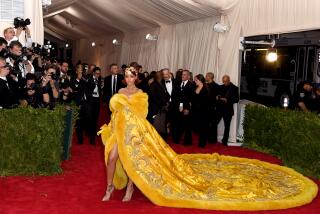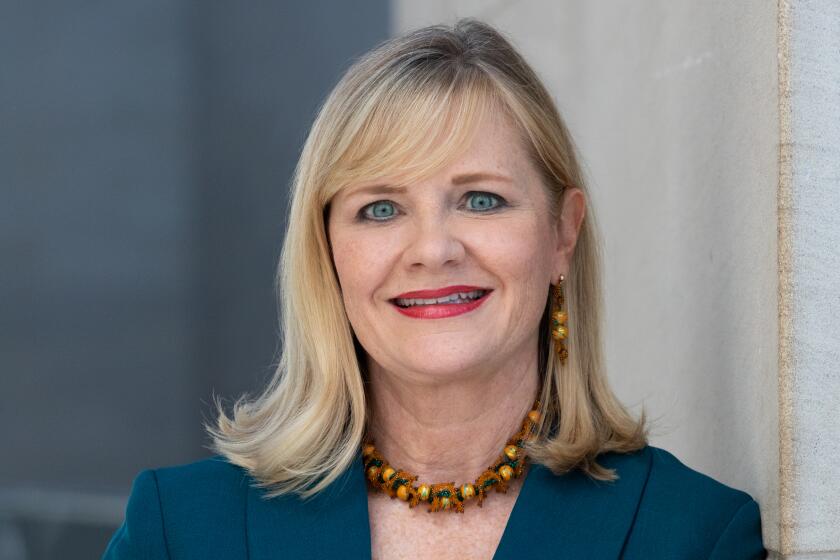CONCERT BY NEW MUSIC GROUP : BOULEZ LEADS TRIBUTE TO LAWRENCE MORTON
Lawrence Morton could be snippy. He didn’t suffer fools gladly, and he tended to regard as a fool anyone who failed to share his special passions. It was, in the long view, an endearing trait.
Like all champions of unglamorous causes, Morton had good reason to be petulant from time to time. For many years, he labored--with modest pay, small thanks and little success--to make Los Angeles receptive to flights of invention and experimentation.
He loved music that was very new, very old or very esoteric. He served as a patron saint of the unjustly neglected. He wrote, back in 1957, that a score didn’t necessarily have to be likable, beautiful or pretty to warrant our attention--just interesting.
He fought for Stravinsky and Schoenberg at a time when this city regarded these epochal composers as merely eccentric, unimportant emigres.
He introduced Pierre Boulez at a time when the French composer-conductor was dismissed, in the few quarters that even recognized him, as a strange fellow who confused music with math and a baton with a scalpel.
Morton, who died in May at 82, left an imposing legacy among the avant-garde cognoscenti. He inspired reverence in the fallow fields of academe. As far as our myopic masses were concerned, however, he made hardly any impression at all.
With his Monday Evening Concerts often playing to nearly empty houses, he had to settle for the succes d’estime reserved for dauntless zealots, brave pioneers and stubborn visionaries. Widespread popularity was reserved for the purveyors of recycled Tchaikovsky, Puccini and--probably most irksome to Morton--Carl Orff.
Some things, alas, do not change.
Wednesday night at the Japan America Theatre, the New Music Group of the Los Angeles Philharmonic presented a Morton tribute.
The blessedly brief program, devoted to miniatures of Stravinsky, Webern and Boulez, represented a collection of jewels. The performances were absolutely brilliant. Pierre Boulez, now an internationally celebrated superstar, flew in to preside personally. Tickets were free. Repeat: free.
And the audience didn’t even come close to filling the 841 seats.
The program opened with a touch of gratuitous melodrama. Dale Hikawa played Stravinsky’s muted, soulful “Elegie” for solo viola (1944) in a pitch-dark auditorium, a feeble spotlight illuminating her shadowy figure on the podium. The sound, fortunately, proved more poignant than the funereal sight.
Next, Susan Narucki traced the high, sometimes jagged lines of Stravinsky’s Two Poems of Konstantin Balmont (1911) and Three Japanese Lyrics (1913) with uncanny accuracy, purity and sweetness. Boulez and the chamber ensemble provided glittery support.
In his own “Eclat” (1965), Boulez defined the shifting textures, fragmentary developments and piquant dynamic impulses with incredible degrees of clarity and tension. Gloria Cheng attended with elan to the extended piano cadenzas.
Boulez brought comparable refinement to the delicate compressions of Webern’s Concerto for Nine Instruments (1934) and Five Pieces (1911; 1913). In the process, he hinted at the source of some of his own fundamental impulses as a composer.
Finally, ably assisted by Narucki, he turned to the first two of his “Improvisations sur Mallarme” (1957), classically economical essays that contrast complex ensemble structures with pointillistic nuance networks.
This music used to seem cool, calculated, excessively cerebral. Now it is beginning to sound gently, endearingly, subtly emotional.
Lawrence Morton would have appreciated the change in perception.
More to Read
The biggest entertainment stories
Get our big stories about Hollywood, film, television, music, arts, culture and more right in your inbox as soon as they publish.
You may occasionally receive promotional content from the Los Angeles Times.






